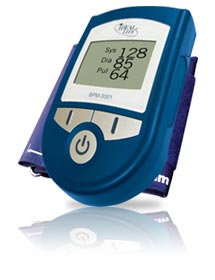 Ideal Life's Blood Pressure Cuff
Ideal Life's Blood Pressure Cuff
Verizon Wireless' plans for an FDA-cleared mobile health platform focused on chronic disease management and other health conditions has been in the works for some time. The software platform, officially called The Verizon Wireless Converged Health Management (CHM) Device has just secured Class II 510(k) clearance from the FDA this month. Once it commercially launches, it will be available via prescription only. Verizon submitted the device for clearance in August 2012.
Based on the FDA decision summary documents, the CHM device appears to be similar in function to other telehealth platform plays in the market today. The company cited platforms from both Vignet and Alcatel Lucent as predicate devices.
"The CHM Device is a remote monitoring software solution intended to collect and store biomnetric data from physiological measurement devices intended for use in the home," the company writes in its FDA submission. The CHM device is not intended for use in clinical settings. "It is not interpretive, nor is it intended for diagnosis or as a replacement for the oversight of healthcare professionals. It does not provide real-time or emergency monitoring."
Verizon Wireless is only working with Ideal Life initially to connect personal health devices to its just cleared remote monitoring platform. The FDA documents point to a handful of Ideal Life devices specifically: the company's blood pressure cuff, glucose monitor, pulse oximeter, weight scale, and its communication gateway, the Ideal Life Pod.
The company describes the CHM device automatically transmits the medical data it collects to remote secure server via embedded cellular where both patients and providers can review the data. Verizon Wireless tells MobiHealthNews that while patients will have a mobile app and an online portal to review the data from, clinicians initially will only have an online portal. Notably, Verizon's platform doesn't only transmit the data, it also offers educational and motivational functions. For example, it enables "clinicians to send tasks, recommendations, surveys, educational, and motivational messages to patients" to their phones or via the online portal, a company spokesperson tells MobiHealthNews.
As former Verizon Wireless executive Arthur Lane explained to MobiHealthNews for our Mobile Operators report last year, the company does not plan to market health services directly to consumers via the Verizon Wireless brand. Verizon Wireless' overall strategy is to develop a suite of tools and services that build a home-based care and healthcare monitoring system that emphasizes “touch and tune” via “short chirps” and move beyond a pure face-to-face form of healthcare delivery, which has become less efficient now that chronic diseases are the main source of health expenditures nationally.

















